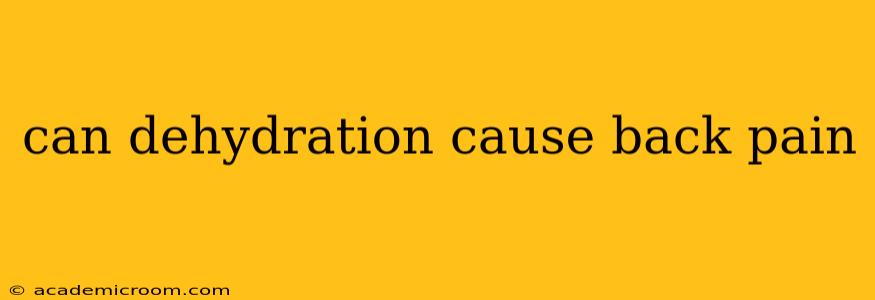Dehydration, often overlooked as a potential culprit, can indeed contribute to back pain. While not the primary cause in most cases, insufficient water intake can exacerbate existing back problems and even trigger pain in some individuals. This article explores the connection between dehydration and back pain, answering common questions and providing insights into how hydration impacts your spinal health.
How Does Dehydration Affect the Back?
Our bodies are approximately 60% water, and this vital fluid plays a crucial role in numerous bodily functions, including maintaining the health of our intervertebral discs. These discs act as cushions between the vertebrae in our spine, absorbing shock and allowing for flexibility. When dehydrated, these discs lose hydration, becoming less resilient and more susceptible to damage. This can lead to:
- Reduced Disc Height: Dehydrated discs shrink, putting pressure on the surrounding nerves and potentially causing pain.
- Increased Risk of Injury: Less hydrated discs are more vulnerable to injury from even minor movements or stresses.
- Muscle Spasms: Dehydration can lead to muscle cramps and spasms, particularly in the back muscles, which further contribute to back pain.
- Inflammation: Dehydration can also contribute to inflammation throughout the body, including in the spine, exacerbating pain.
Can Dehydration Cause Lower Back Pain?
Yes, dehydration can contribute to lower back pain. The lower back bears the majority of the body's weight, making it particularly susceptible to the effects of dehydration. The reduced cushioning provided by dehydrated discs in the lumbar region can increase pressure on the nerves and facet joints, leading to pain and discomfort.
Can Dehydration Cause Upper Back Pain?
While less common than in the lower back, dehydration can also affect the upper back. Dehydration-related muscle spasms in the upper back and neck can lead to stiffness, pain, and limited range of motion.
What are the Other Symptoms of Dehydration?
Recognizing dehydration is crucial. Beyond back pain, common symptoms include:
- Extreme Thirst: A primary and often overlooked sign.
- Dry Mouth and Skin: Your mouth feels dry, and your skin may appear less supple.
- Headache: A common symptom often attributed to other causes.
- Fatigue and Dizziness: Lack of energy and feeling faint.
- Dark-colored Urine: Concentrated urine indicates dehydration.
- Muscle Cramps: Severe muscle spasms can be a sign of significant dehydration.
How Much Water Should I Drink Daily to Avoid Back Pain?
There's no single magic number for daily water intake, as individual needs vary based on factors like activity level, climate, and overall health. However, aiming for at least eight glasses of water a day is a good starting point. Listen to your body – if you feel thirsty, drink water. Consider increasing your water intake if you experience back pain, especially if other symptoms of dehydration are present.
How to Treat Dehydration-Related Back Pain?
If you suspect your back pain is related to dehydration, the first step is to increase your fluid intake. Drinking plenty of water will help rehydrate your body and discs. Other treatments may include:
- Rest: Avoid activities that aggravate your back pain.
- Over-the-counter pain relievers: Ibuprofen or acetaminophen can help manage pain and inflammation.
- Heat or ice packs: Applying heat or ice to the affected area can provide relief.
- Gentle stretching and exercise: Once the pain subsides, gentle movement can help improve flexibility and reduce stiffness.
Important Note: While dehydration can contribute to back pain, it's crucial to consult a healthcare professional if you experience persistent or severe back pain. Other underlying medical conditions may be the cause, and a proper diagnosis is essential for effective treatment. This information is intended for general knowledge and does not constitute medical advice.
